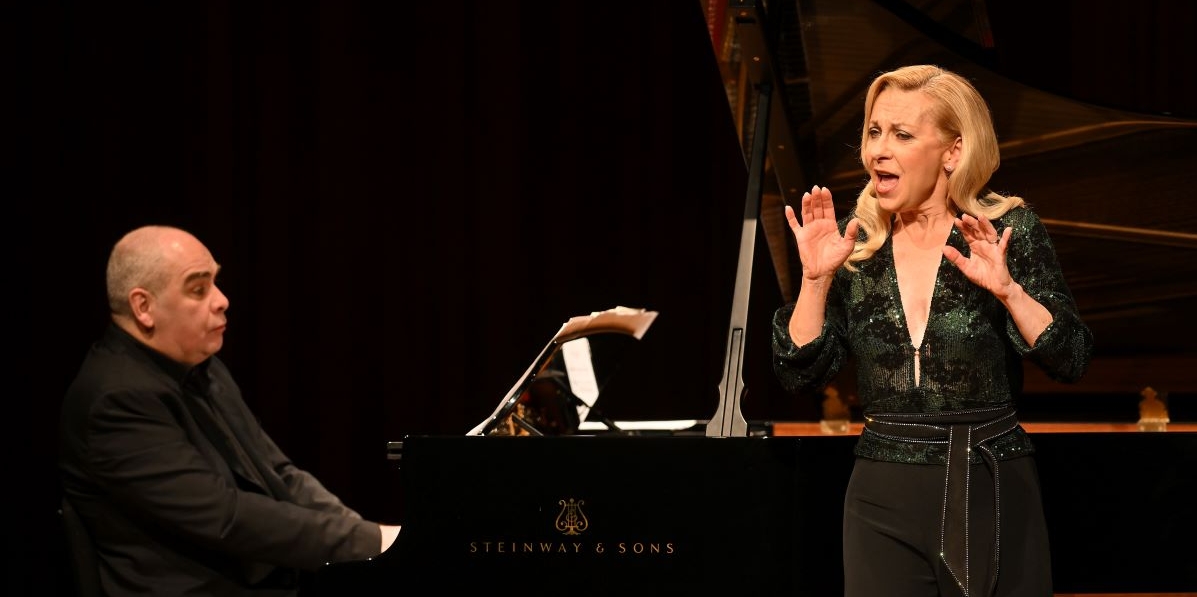Natalie Dessay was one of the wonders of the opera world. Who can forget her ‘Doll’s Song’ Contes d’Hoffman) in Paris? (Do watch it on YouTube!) Or La Fille du Régiment, Sonnambula, Lucia – the list is endless. When she suddenly retired from opera in 2013 at 48, the opera world was shocked. She continues to give recitals, and will retire with a farewell tour in 2025 when she is 60.
It is therefore an exceptional occasion to hear her again, in the relaxed venue of Milton Court in Silk Street.
A recital is an intimate form of communication for a singer. The art song, is all about the artistry. There is no orchestra to paint the picture, just the piano. The singer creates the story.
The German first half was dedicated to women composers – Fanny Mendelssohn, Clara Schumann and Alma Mahler. Fanny Mendlessohn’s ‘Dämmrung senkte sich von oben’ started hesitantly. Silk Street was an apt venue, because Dessay wove delicate phrasing like spun silk, especially in ‘Vorwurf’. This song can drag and the top note on ‘denkst’, instead of popping out as I have heard, was beautifully within the seamless phrasing. By the third song, Suleika, Dessay was warmed up and immersed in the characters.
In the Clara Schumann songs, Dessay used the language expressively, for example tenderness for ‘schätze’. ‘Sie liebten sich beide’ was sung with a slower tempo than usual, which suited Dessay’s interpretation. ‘Warum willst du and’re fragen’ was sung as a mini-aria. This led perfectly into the thrilling ‘er ist gekommen’, another mini-aria, where Dessay mingled dramatic phrases with gorgeous pianissimi. It worked especially well in the Alma Mahler songs, in particular the description ‘in meines Vaters Garten’. She is a good storyteller.
The French second half, in Dessay’s native language, Dessay lifted off. Chausson’s tragic Chanson perpétuelle, allowed Dessay to paint a powerful picture of quivering young love betrayed, which was gorgeously descriptive. Poulenc’s La dame de Monte-Carlo was a party piece, sung with great theatricality. There are similarities with La Voix Humaine, written three years before. At the end, she went to the front of the stage, and held the final Ca-(rlo), starting with the tiniest sound, and building it forever. Yes, she still has the breath control. This was her pièce de resistance.
Then followed three arias. I did not see the point of the short extract from Debussy’s Pelléas and Melisande. ‘Pleurez mes yeux’ from Massenet’s Le Cid, is tough to pull off. Callas sang it with such dramatic intensity, that a lighter voice like Dessay’s cannot do. It is better suited to a more dramatic voice, but nonetheless heartfelt. The official programme ended with ‘Ah! je ris’ from Gounod’s Faust. The first ‘ah’ was sung with a ppp staccato perfectly. Dessay came into her own with the repertoire which has always suited her best, showing perfect coloratura and excitement when Marguerite finds the jewels.
A recital always has built-in encores, so it was a disappointment that Cassard had forgotten to bring the scores! I have been to many recitals, and never seen this before. ‘Tu m’a donné le plus doux rêve from Lakmé was the only encore, accompanied with basic chords, allowing Dessay to show off her still amazing top note technique. Then that was it. A programme which should have been nearly two hours, lasted 95 minutes. Had we heard La Dame de Monte Carlo again, everyone would have left happy, instead of slightly disappointed.
It was still wonderful to hear Dessay again. She does wriggle around a little too much, but that is her way of performing. She also possesses the best vocal palette of pianissimi I have ever heard.

